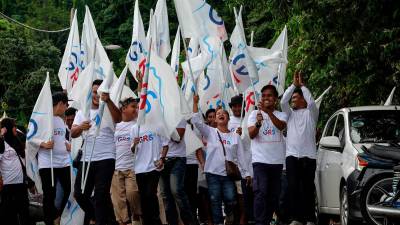KOTA KINABALU: Political cooperation between Gabungan Rakyat Sabah (GRS) and Pakatan Harapan (PH) is seen as the right move for both coalitions to combine their influence and secure a comfortable majority in the upcoming 17th Sabah State Election .
Universiti Malaysia Sabah (UMS) senior lecturer Associate Prof Dr Syahruddin Awang Ahmad said only a strong majority would enable the establishment of a stable government in Sabah, as desired by all its people.
The Deputy Dean of the Faculty of Social Sciences and Humanities believes that, based on the current situation, parties contesting on their own are unlikely to win even a simple majority of 37 out of 73 state seats and thus political cooperation needs to be forged early.
He said the formation of a GRS-PH coalition government, if given the people’s mandate in the election, would be a pragmatic step to ensure administrative stability and continuity of the state’s development policies.
“Therefore, leaders must demonstrate political maturity by prioritising the interests of the state above their respective party agendas,” he told Bernama.
He said this state election is expected to be more complex, with the participation of multiple coalitions such as GRS-PH, Barisan Nasional (BN)-PH, and other local parties including Parti Solidariti Tanah Airku (STAR) and Parti Maju Sabah (SAPP), which will contest independently.
Syahruddin said a preliminary analysis by the UMS GeoPES (Borneo Geopolitics and Electoral Studies) research team indicates that most seats may see narrow margins due to unprecedented competition.
“With the changing political dynamics, including divisions among local parties and the presence of GRS-PH as well as BN, votes are expected to be more fragmented.
“Urban voters will assess candidates based on their quality rather than party affiliation. Therefore, while incumbent parties may win, smaller majorities are a more realistic scenario,” he said.
Meanwhile, UMS senior lecturer Dr Haryati Abdul Karim said GRS’s decision to announce its cooperation with PH early is a wise move, as it sends a clear message that GRS and PH will form the government together if given the mandate by the people in the election.
The lecturer from the Faculty of Social Sciences and Humanities said current trends indicate that no party is likely to become dominant; hence, the best approach is to form a government comprising political parties capable of working together.
She noted that if GRS were to go solo, it could face difficulties in winning due to unresolved issues affecting the people, particularly concerning basic infrastructure such as water supply.
“Choosing to cooperate with PH, which represents national parties like PKR and DAP, will help maintain strong ties between the state and the Federal Government,” she said.
Haryati added that good relations with the Federal Government are crucial to ensuring the continuity of development projects planned and underway in Sabah, so that the state’s people are not left behind in the nation’s progress.
GRS chairman Datuk Seri Hajiji Noor had earlier said that close ties between the state and the Federal Government are vital to accelerating Sabah’s development, and therefore, the strong cooperation currently in place must be maintained and continued in the future, particularly through the GRS-PH partnership.
